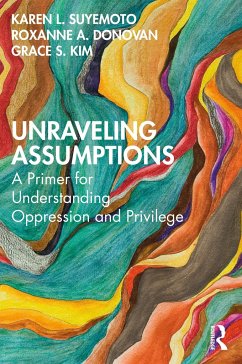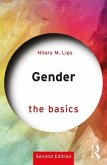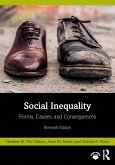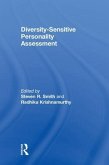Unraveling Assumptions: A Primer for Understanding Oppression and Privilege offers fundamental understandings of concepts and frameworks related to diversity and social justice. Aimed at university and community audiences, it offers an introductory exploration of power, privilege, and oppression as foundations of systems of inequality and examines complexities within meanings and lived experiences of race, ethnicity, gender, sexuality, disability, and social class.
After considering why it is so difficult to engage these issues, the authors explore meanings and impacts of power, privilege, and oppression as a primary lens of analysis. Subsequent chapters offer definitions of race, ethnicity, gender, sexuality, disability and social class, identifying erroneous assumptions and challenging the tendency to oversimplify and decontextualize. Meanings, identities, and effects of oppression and privilege are central foci within each chapter. The book ends with a chapter examining ways that individuals may take action as allies and advocates to resist oppression. Throughout the book, Unraveling Assumptions makes connections among individual, interpersonal, and systemic levels of inequality, while focusing on relational and psychological implications for lived experience-including the reader's lived experience.
By integrating social science research with concrete examples and personal reflection, this concise, introductory level text invites the reader to consider the costs of systemic hierarchies for all people and envision possible alternatives to participating in oppressive hierarchy.
Unraveling Assumptions is a book for students and community to learn about privilege and oppression. The authors' companion book Teaching Diversity Relationally offers process-oriented guidance for educators teaching this material to successfully negotiate the inherent psychological and relational challenges.
After considering why it is so difficult to engage these issues, the authors explore meanings and impacts of power, privilege, and oppression as a primary lens of analysis. Subsequent chapters offer definitions of race, ethnicity, gender, sexuality, disability and social class, identifying erroneous assumptions and challenging the tendency to oversimplify and decontextualize. Meanings, identities, and effects of oppression and privilege are central foci within each chapter. The book ends with a chapter examining ways that individuals may take action as allies and advocates to resist oppression. Throughout the book, Unraveling Assumptions makes connections among individual, interpersonal, and systemic levels of inequality, while focusing on relational and psychological implications for lived experience-including the reader's lived experience.
By integrating social science research with concrete examples and personal reflection, this concise, introductory level text invites the reader to consider the costs of systemic hierarchies for all people and envision possible alternatives to participating in oppressive hierarchy.
Unraveling Assumptions is a book for students and community to learn about privilege and oppression. The authors' companion book Teaching Diversity Relationally offers process-oriented guidance for educators teaching this material to successfully negotiate the inherent psychological and relational challenges.
Unraveling Assumptions opens the door to seeing your place in the world in a new way. Suyemoto, Donovan, and Kim lead their readers to a nuanced understanding of oppression and privilege, supported by concrete tools to deepen engagement with one's own learning process. The clear examples and personal reflection prompts encourage self-reflection and meaningful conversations.
Sofya Aptekar, Associate Professor, School of Labor and Urban Studies, City University of New York
Conversations about privilege, oppression, racism, social class, disability, sexuality, gender, and culture, can be like walking amid land mines. How, therefore, do we resist together while we hold ourselves accountable and stay in relationship? Suyemoto, Donovan, and Kim offer much more than a clear conceptual map for having these conversations, offering resources and stories that can help us transverse these land mines without losing our souls or the other. This is a must book in courses related to social justice, multicultural education, human services, psychology, and almost any professional field that hopes to incorporate dialogue across difference and the pervasive injustice that has been part of each of us.
Gonzalo Bacigalupe, Professor, Department of Counseling and School Psychology, University of Massachusetts
Suyemoto, Donovan, and Kim's Unraveling Assumptions: A Primer for Understanding Oppression and Privilege is the book I have been looking for since I started teaching multicultural psychology over 10 years ago. It provides excellent descriptions of important constructs while also engaging the reader to reflect on their assumptions, experiences, and emotional reactions with reflection prompts. The authors both challenge and encourage the reader throughout the book and also provide ideas on how to continue the work of resisting oppression.
Nadine Nakamura, Professor, California School of Professional Psychology, Alliant International University
In Unraveling Assumptions: A Primer for Understanding Oppression and Privilege, Suyemoto, Donovan, and Kim pedagogically address and explain important key concepts in understanding issues surrounding diversity such as race, ethnicity, and intersectional identities such as gender, class and sexuality. The book guides the readers with examples and reflection questions that are easily transferable to the European context. This is an important piece of work which should be read by all students who are studying Ethnic and Migration Studies. The book is also a great resource for researchers and academic staffs within the field of Ethnic and Migration Studies in Europe to start reflecting upon ourselves and what it means to work with diversity and social justice.
Sayaka Osanami Törngren, Associate Professor, Global Political Studies, Malmö University
Sofya Aptekar, Associate Professor, School of Labor and Urban Studies, City University of New York
Conversations about privilege, oppression, racism, social class, disability, sexuality, gender, and culture, can be like walking amid land mines. How, therefore, do we resist together while we hold ourselves accountable and stay in relationship? Suyemoto, Donovan, and Kim offer much more than a clear conceptual map for having these conversations, offering resources and stories that can help us transverse these land mines without losing our souls or the other. This is a must book in courses related to social justice, multicultural education, human services, psychology, and almost any professional field that hopes to incorporate dialogue across difference and the pervasive injustice that has been part of each of us.
Gonzalo Bacigalupe, Professor, Department of Counseling and School Psychology, University of Massachusetts
Suyemoto, Donovan, and Kim's Unraveling Assumptions: A Primer for Understanding Oppression and Privilege is the book I have been looking for since I started teaching multicultural psychology over 10 years ago. It provides excellent descriptions of important constructs while also engaging the reader to reflect on their assumptions, experiences, and emotional reactions with reflection prompts. The authors both challenge and encourage the reader throughout the book and also provide ideas on how to continue the work of resisting oppression.
Nadine Nakamura, Professor, California School of Professional Psychology, Alliant International University
In Unraveling Assumptions: A Primer for Understanding Oppression and Privilege, Suyemoto, Donovan, and Kim pedagogically address and explain important key concepts in understanding issues surrounding diversity such as race, ethnicity, and intersectional identities such as gender, class and sexuality. The book guides the readers with examples and reflection questions that are easily transferable to the European context. This is an important piece of work which should be read by all students who are studying Ethnic and Migration Studies. The book is also a great resource for researchers and academic staffs within the field of Ethnic and Migration Studies in Europe to start reflecting upon ourselves and what it means to work with diversity and social justice.
Sayaka Osanami Törngren, Associate Professor, Global Political Studies, Malmö University








